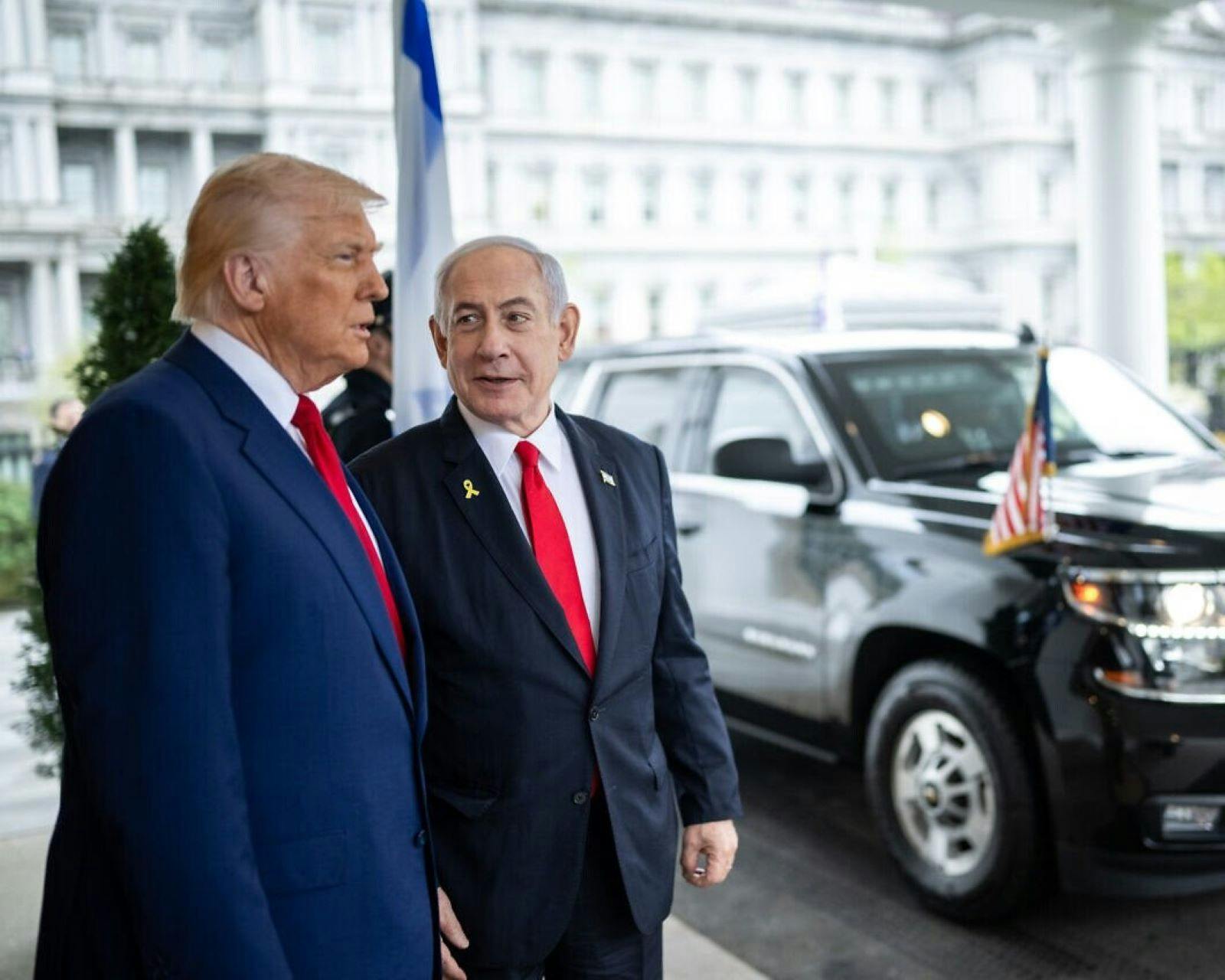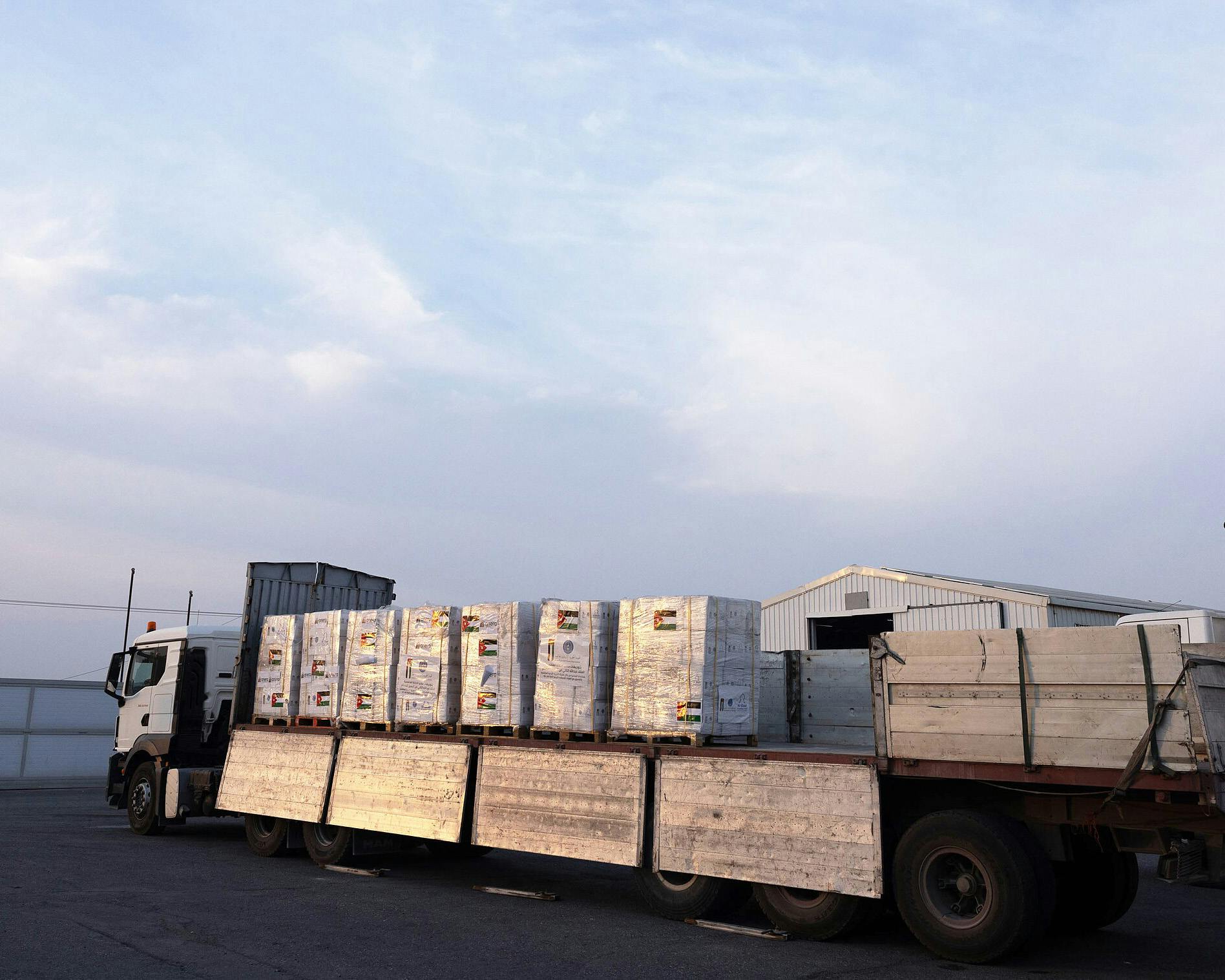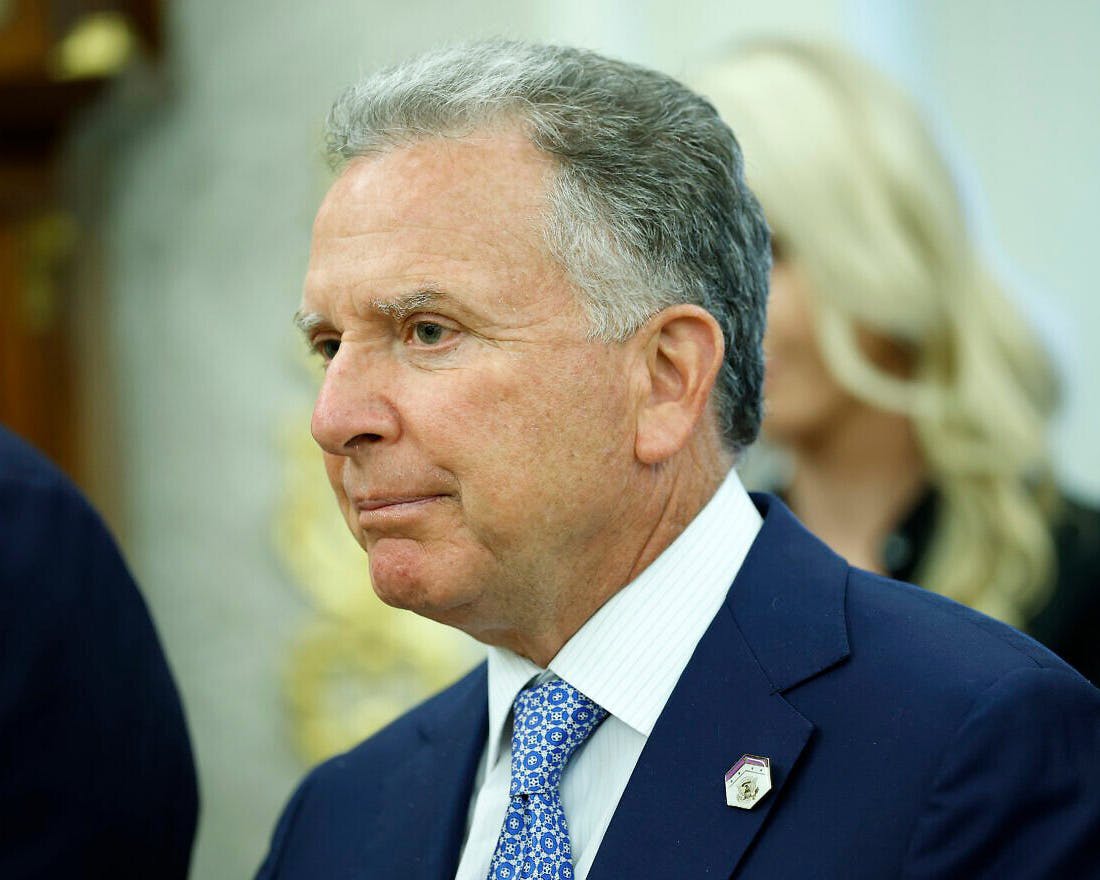Trump-Netanyahu Confab to Celebrate Military Ops against Iran, Reshaping Middle East

Monday, 7 July 2025 | US President Donald Trump is hosting Israeli Prime Minister Benjamin Netanyahu for the third time since assuming the presidency for a second term almost six months ago. At this point, it is clear that the invitations are much more than symbolic gestures. Trump and Netanyahu are working more closely together than any other world leaders and are charting a course for a new Middle East.
On the face of it, the visit represents a celebratory victory lap for both leaders.
With the support of the greatest friend in the White House Israel has ever had, Netanyahu ordered one of the most daring military operations of all time on Iran’s illegal nuclear facilities. Trump made up for the sins of previous US administrations that bolstered Iran by providing Israel with the weapons and diplomatic cover it needed to launch the attack.
“Operation Rising Lion” was a stunning success. Without losing a single plane or pilot over 12 historic days, Israel struck devastating blows to Iran’s nuclear program and ballistic-missile capabilities, severely weakening and humiliating Iran’s leaders.

Once Israel had proven its definitive air superiority, Trump ordered “Operation Midnight Hammer” to put the nail in the coffin of the Iranian nuclear program.
Netanyahu and Trump’s collaboration was effective and flawless. The operations will go down in the history books and are worthy of a White House celebration.
Iran had Destabilized the Entire Middle East
The joint military campaigns not only assured Israel’s safety from an existential threat, it reset the equation. Iran has been destabilizing the entire Middle East, with terror proxies operating in Iraq, Syria, Lebanon, Yemen and Gaza. These proxies threatened American allies across the region and beyond.
The strikes on Iran’s nuclear facilities didn’t happen in a vacuum. Since the Hamas massacre of southern Israel on October 7, 2023, Israel has been at war with Iranian-backed terror proxies. For more than 620 days, Hamas, Hezbollah and the Houthis, and Iran itself have fired tens of thousands of rockets at Israel.
Israel responded by methodically shaving down Iran’s terror tentacles. Extended military campaigns severely degraded Hamas and Hezbollah. Both Israel and the United States have struck hard at Houthi strongholds in Yemen. Then came the surprise strikes against the head of the terror octopus: Iran itself. Following “Operation Rising Lion,” the Islamic Republic is no longer a regional superpower and can no longer inflict its malign influence.
Netanyahu’s Vision
Yet long before “Operation Rising Lion,” and for years prior to October 7, Netanyahu had been talking of a new Middle East. Many believed that he was an unrealistic dreamer or the peddler of fantasy. Pessimists never saw a path for Israel and the region out of a paradigm of conflict.
Yet just as he succeeded in liberating Israel’s economy, transforming a developing nation into a global economic power, by promoting deregulation and massive multinational investment, Netanyahu is proving once again to be a visionary.
Just as Trump wanted for America to share in Israel’s victory over Iran, Trump wants America to benefit from Netanyahu’s Mideast vision. And he is using the leverage of the world’s greatest superpower in an attempt to unleash the vision’s potential.
Trump respects the power of Israel’s military and start-up economy, as well as its ingenuity and resilience. He also recognizes the benefits that a realigned Middle East offers not only to the countries in the region but to America and the rest of the free world.
To realize this vision, Netanyahu and Trump have instituted a simple formula: Defeat the terrorists and work with the moderate actors. To put this formula into motion, Trump and Netanyahu needed to break several long-held paradigms.
Balance Is not Power
The first shift is recognizing that the longtime American policy of promoting a balance between rival powers is a recipe for disaster. For years, America sought to create parity and balance between Israel and the Palestinians, in the wider region between Israel and Iran, and between Iran and Saudi Arabia. This American projection failed to appropriately recognize and appreciate Islamic culture.
Peace cannot be reached in the Middle East by equilibrium. To the contrary, by its very name, Islam means submission. Peaceful conditions are only met when all parties recognize who is strong and who will submit to the stronger power. Any ambiguity is a trigger for conflict.
Trump has acted with America-first common sense: to give full support to pro-Western allies that want to work with America to achieve common goals; and to isolate entities that neither share American values nor offer America any positive benefits.
Palestinians Are not America’s Allies
The second paradigm shift builds on the previous one by finally recognizing that Palestinians have never proven themselves to be reliable or valuable allies of America. To the contrary, the Palestinians have offered America and the region little to nothing over the last decades. Their largest economic driver is corruption. Their primary exports are terror, boycotts and propaganda.
Palestinians have impeded reconciliation with Israel by repeatedly violating their minimal commitments under the Oslo Accords, rejecting unmerited land for peace offers, and allowing terror factions to compete for dominance within their territories. They continue to incite violence and directly finance regional terrorism with stipends to terrorists sitting in Israeli jails, and the families of so-called “martyrs” killed in the act of attempting first-degree murder.
October 7 has taught Israel once and for all that the Palestinians can never be equal partners for peace. To the contrary, as long as Palestinians have full autonomy, their territories will always be hornet’s nests of terror—even if many Palestinians recognize that Israel cannot be defeated, and that the conflict dramatically reduces their own quality of life and economic mobility.
Hamas has suffered a devastating blow, and the Palestinian Authority [PA] is exposed, no longer possessing a veto on regional peace. As such, the PA itself is at risk of collapse—just as Bashar Assad fell in Syria once its backers, Iran and Hezbollah, were weakened.
Ahead of Netanyahu’s visit, a bombshell article in the Wall Street Journal indicated that major clans in Hebron, home to the largest Palestinian population in Israel, are prepared to defect from the Palestinian Authority and recognize Israeli sovereignty.
It could be a model for clans to follow in other Palestinian-majority cities, whereby Israel recognizes local Palestinian leaders who can administer and police regionally, without the need for a centralized PA.
Israel is experimenting with the same model in Gaza, by providing backing to the Abu Shabab clan as a potential ruling alternative to Hamas.
Breaking the Palestinian Veto on Regional Progress
Beyond its own borders, Palestinians have impeded regional progress by imposing a veto on peace between Israel and other countries across the region. American governments, particularly the Obama and Biden administrations, continually reinforced the theory of a Palestinian veto. Trump shattered it.
By breaking the veto, Trump, in his first term, was able to broker normalization agreements between Israel and the United Arab Emirates, Bahrain, Morocco and Sudan.
When Trump lost to Joe Biden, several other normalization agreements were on the table. Yet the Biden administration pulled America back to failed paradigms: insisting that the Abraham Accords could be no substitute for a two-state solution based on land for the empty promise of peace. And that sanctioning Iran was no way for America to treat a misunderstood enemy.
Now that these paradigms have been broken and Iran has been defeated, Netanyahu and Trump are set to take the next steps in their journey to reset the region. At the White House, the two leaders will engage in working meetings aimed at bringing the October 7 war to a conclusion and to jumpstart the Abraham Accords.
Ending the War in Gaza
As Netanyahu departed for his trip to the White House, an Israeli negotiation team headed to Qatar for ceasefire talks aimed at returning the remaining 20 living hostages and 30 bodies held by Hamas in Gaza. Hamas continues to hold hostages, and hundreds of its armed members continue to attack Israeli soldiers and American aid workers, while terrorizing their own population. Yet they are no longer a governing force. At this point, no one is.
Hamas’s senior chain of command has been devastated, as has its mid-level command. There is no organizational structure. They are no longer a military force. And much of Gaza—booby-trapped by Hamas—has been leveled. The Gazan people, who have falsely claimed refugee status for decades, are now being forced to practice what they preach. As such, Israel is ready to declare a victory.
The United States is putting heavy pressure on Qatar to push Hamas to give up, release the hostages and end the war. The war is likely to end in two phases: a temporary 60-day ceasefire, in which 10 living hostages and 18 bodies are returned to Israel, to be followed by an agreement to end hostilities.
Resettling Gaza Refugees
In their meetings, Trump and Netanyahu will work on the two greatest pressing questions hovering over a post-war Gaza: Who will govern the war-torn Strip? And will any country, anywhere in the world, open its borders to Gazans the way it would for refugees from any other country?
At the first Trump-Netanyahu White House meeting in February, Trump insisted that Gazans would be relocated, possibly to Jordan or Egypt. While the two countries have thus far held out against accepting any Gazans, America has great economic leverage on both countries. Other countries, including Libya, have been discussed as possible landing spots for Gazans ready to leave the Strip. Strong indications are that as many as half of Gazan residents would be willing to reconsider relocation if an option were presented.
Restarting the Abraham Accords
Trump and Netanyahu will also work on creating the incentives and formulas necessary for establishing normalization agreements with Israel’s neighbors, and Muslim-majority nations the world over. The crown jewel would be a normalization agreement between Israel and Saudi Arabia.
Many have suggested that with Iran now diminished and out of the picture, Saudi Arabia doesn’t need a security relationship with Israel. Yet the opposite is true. Israel has now established itself as the regional superpower and military enforcer. In doing so, it has gained the respect of nations around the region.
And while America participated in the strike, domestic politics can shift quickly in a democracy that holds elections every four years. While Trump has proven himself to be a constructive force for good and a projector of American power, there are no guarantees that future presidents will act in kind.
Both the progressive wing of the Democratic Party and the isolationist wing of the Republican Party may rise to power in the years ahead. If so, Middle Eastern nations will not be able to count on economic and military assistance from the United States. If America does not step up to protect the interests of a volatile region, regional alliances with Israel can prove to be quite effective.
Countries like Saudi Arabia have witnessed that Israel will act to protect its security interests, even at great risk.
Normalization with Saudi Arabia was discussed openly before October 7. In fact, both Hamas and Iran conceded that the atrocities that day were committed at least in part to prevent such an accord. The greatest final of this bitter, nearly two-year war will be to realize the normalization that the region’s malign actors attempted to sabotage.
Lebanon and Syria: Enemies Turned Allies?
Furthermore, the war has created opportunities for normalization that seemed impossible before October 7. When Hezbollah was militarily entrenched in southern Lebanon and Assad leading Syria—both backed by Iran—it seemed impossible that either country would be willing to reconcile with Israel.
But now Iran is no longer a power broker. Hezbollah has been dramatically degraded to the point that it didn’t fire a single rocket during Israel’s 12-day military operation against Iran. Assad was deposed as president, fleeing to exile in Moscow. Syria and Lebanon may now offer Israel normalization possibilities.
Other Muslim-majority countries from the Middle East to Southeast Asia may also be candidates for normalization.
The IMEC Corridor Economic Vision
Working hand-in-hand with Netanyahu, Trump will try to create conditions necessary for nations that never thought they could ever recognize Israel to sign normalization agreements.
Such agreements may offer significant economic benefits as well. In his bid to counter China’s economic trade dominance, Trump seeks to establish an alternative to the Chinese Belt and Road initiative. Trump is working to advance the IMEC (India-Middle East Corridor), which would establish an alternative trade route connecting the Far East with Europe. Saudi Arabia and Israel are key hubs along the route.
Establishing a viable alternative to China requires bypassing critical chokepoints, including the Suez Canal. It also requires regional stability in the Mideast. Regional stability requires defeating the terrorists and promoting normalization with moderate actors.
Helping Israel Puts America First
Netanyahu and Trump are set to discuss bilateral economic relations. During Netanyahu’s last visit to Israel, tariffs were first and foremost on the agenda. A military aid package is also likely to be discussed.
So-called America-firsters have done little to understand how assisting Israel and defeating Iran could go a long way towards establishing American dominance in an economic trade war with China. For Trump, the economic vision sits at the core of his policy agenda. Netanyahu’s vision for a new Middle East will help him realize it.
Helping Israel may have provided some blessings for the US president. Immediately after he bombed Fordow, Trump passed his “Big, Beautiful Bill” by a single vote in the Senate. Trump’s assistance has certainly provided blessings for Israel, and particularly for Netanyahu.
By contrast, when Trump and Netanyahu presented the so-called ‘Deal of the Century’ that would have offered Palestinians a pathway toward statehood on large tracts in Judea and Samaria, and then defaulted on promises to apply Israeli sovereignty in the Jordan Valley, both Trump and Netanyahu found themselves temporarily out of office.
Monday’s meeting should help strengthen and embolden both leaders and take the Netanyahu-Trump new Middle East vision one step closer to reality.
(This article was originally published by the Jewish News Syndicate on July 6, 2025. Time-related language has been modified to reflect our republication today. See original article at this link.)
Related Resources

Discover Your Purpose and God’s Heart For You
In today's divided, turbulent world, it's essential for the Church to rediscover God's heart. Our free e-book, authored by a seasoned expert with three decades of experience in Israel, delves deep into the teachings of Jesus (Yeshua) to reveal God’s principles of love and purpose. Learn how embracing these truths can bring significance and impact to your life, even amidst chaos. Subscribe now to receive your free copy and embark on a journey of transformation.




